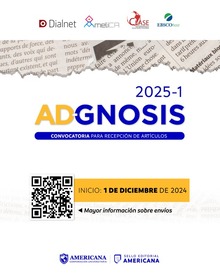Development of organizational theory, around the dynamics of capitalism and innovation
DOI:
https://doi.org/10.21803/adgnosis.v5i5.210Keywords:
Teoría Organizacional, Innovación, Capitalismo, EconomíaAbstract
Este documento pretende exponer el pensamiento sobre la direccio?n de la Teori?a Organizacional, en te?rminos de Innovacio?n a partir de las dina?micas del Capitalismo.
El documento arranca mostrando unos recorridos sobre diferentes estadios de las diferentes escuelas y teori?as que sobre las organizaciones se han desarrollado y las contribuciones que e?stas han aportado al estudio de la organizacio?n desde un punto de vista completo. Se muestra el desarrollo de la funcio?n administrativa desde la Escuela Cla?sica hasta el Paradigma Competitivo, pues este u?ltimo tiene como clave la innovacio?n. Asimismo, se muestra los hitos del capitalismo y su influencia en las corrientes de pensamiento administrativo.
La fundamentacio?n teo?rica tiene que ver con el concepto de Innovacio?n, desde los cla?sicos hasta las posturas ma?s contempora?neas, desde la necesidad de Innovar hasta la Innovacio?n por estrategia. Al final se invita al lector a discutir como estrategias innovadoras robusteceri?an la Teori?a Organizacional.
Palabras clave: Teori?a Organizacional, Innovacio?n, Capitalismo, Economi?a.
ABSTRACT
This document aims to expose the thinking on the direction of the Organizational Theory, in terms of Innovation from the dynamics of Capitalism.
The document starts showing some routes on different stages of the different schools and theories that have been developed about the organizations and the contributions that these have contributed to the study of the organization from a complete point of view. It shows the development of the administrative function from the Classical School to the Competitive Paradigm since the latter has the key to innovation. It also shows the milestones of capitalism and its influence on the currents of administrative thought.
The theoretical foundation has to do with the concept of Innovation, from the classics to the most contemporary positions, from the need to Innovate to Innovation by strategy. At the end, the reader is invited to discuss how innovative strategies would strengthen the Organizational Theory.
Keywords: Organizational Theory, Innovation, Capitalism, Economy.
Downloads
References
Burns, T. & Stalker, G. M. (1961). Organizaciones Mecanicistas y Orgánicas. Harvard Bussines School Press.
Christensen, C. M. (1997). The Innovators Dilemma: when new technologies cause great firms to fail. Boston, Massachusetts: Harvard Business School Press.
Christensen, C. M. & Rosenbloom, R. (1995). Explaining the attacker’s advantage: technological paradigms, organizational dynamics and the value network. Research Policy, 24, 233-257.
Drucker, P. (1954). La Práctica del Management.
Drucker, P. (1985). La innovación y el empresario innovador. Ed. Edhasa.
Hamel, G. (2002). Leading the Revolution: How to Thrive in Turbulent Times by Making Innovation a Way of Life. Boston: Harvard University Press.
Hamel, G. (2012). Lo que importa ahora. Bogotá: Grupo Norma.
Hamel, G. & Prahalad, C.K. (1996). Compitiendo para el futuro. Harvard Bussines School Press.
Heilbrouner, R. (1985). Vida y obra de los grandes economistas. Barcelona: Orbis.
Hetzberg, F. (2010). The Motivation to Work. Library of Congress.
Higuera Ojito, V. (2013). Análisis económico de la demanda educativa en programas de Ciencias Económicas: un modelo de elección basado en un logit binomial. AdGnosis, 2(2), 13-21.
Koontz, H., O’Donnell, C. & Weihrich, H. (1984). Management. New York: McGraw-Hill.
Manual de Olso (2005). Guidelines for Collec- ting and Interpreting Innovation data. 3 Ed.
Maslow, A. (2005). El Management Según Maslow: Una Visión Humanista para la Empresa de Hoy. Barcelona: Editorial Paidós.
Mendoza, J. M. (2006). Innovación por lo alto, Asesores del 2000. Factores claves iden- tificados en las alianzas Universidad-In- dustria en proyectos de innovación ejecutados en la costa Caribe colombiana. Abello Llanos Raimundo Ph.D. 2007, p.34.
Miller, R. (1985). La direction des entreprises. Concepts et aplications. Montreal Agence D’art.
Mintzberg, H. (2009). Managin. Bogotá: Norma.
Mintzberg, H. (1979). The structuring of organization. Englewood Clif, New Jersey: Prentice-Hall.
Ohmae, K. (2004). La Mente del Estratega. España: McGraw-Hill.
Porter, M. (1990). The Competitive Advantage of Nations. Londres: MacMillan.
Schumpeter (1934). Economic Reconstruction: The Columbia Report. Journal of political economy. The Universitu of Chicago Press.
Weber, M. (1958). The Spirit of capitalism. In The Protestant Ethic and the Spirit of Capitalism (traducción de T. Parsons) (pp. 47-79). New York: Charles Scribner’s Sons.
Wren, D. A. (1979). The evolution of management tough. 2a ed. New York: Jonh Wiley and Sons.






